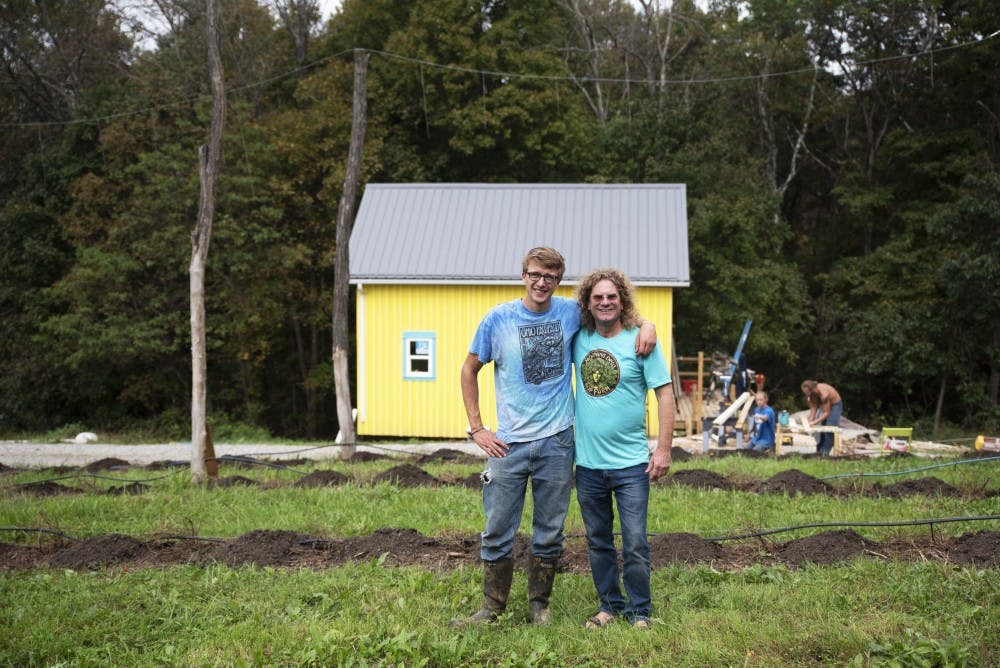Two Ohio University alumni who graduated decades apart came together and started what is now Morning Dew Hop Farm, located at 42520 State Farm Road in Albany.
Steve Geisler, who graduated in 1995, and Casey Buchanan, who graduated in 2015, started their venture into the world of growing hops nearly two years ago. The pair purchased a 23-acre farm after discovering there was a high demand for hops in the area.
“We realized that the demand for growing hops in the area is huge,” Buchanan said. “There is no one really doing it here, so we thought we could get our foot in the door by being the first organic hop farm in the area.”
Planting roots
The unlikely pair met when Buchanan was working at a chiropractor’s office as an intern. Geisler and Buchanan discovered they were both interested in similar things and decided to pursue opening a business together.
“I thought I was going to be a chiropractor for a while,” Buchanan said. “But I took a lot of organic farming classes, and I fell in love with farming.”
After deciding to grow hops, Geisler and Buchanan joined the Ohio Hops Growers Guild. They began attending meetings to learn the growth process. After three or four meetings, the pair officially decided having a hop farm was something they could do, Buchanan said.
The name of the farm has a bit of a hidden message in it, Geisler said.
“We had to come up with a cool name,” Geisler said. “(Morning Dew) is a Grateful Dead song and we are kind of deadheads a little bit, and so we thought it’s undercover. It’s not complete Grateful Dead symbolism so deadheads will know what it means.”
The first year, after the two purchased the farm, was spent solely setting everything up and figuring out farming methods. They had to make the field compatible to grow hops and set up a trellis system. Along with setting up the hop yard, Buchanan made an irrigation system based off of the FertiGator fertilizing tool.
“(The farm) has come a long ways in a year,” Geisler said. “If we made that many jumps in one year and do that again next year that would be really good.”
This year, Geisler and Buchanan made about $700 from the 135 pounds of hops they harvested. They sold the hops to Little Fish Brewing Company, 8675 Armitage Road, to make a “wet-hop” brew. The hops produced 175 gallons of the beer.
In the future, Geisler and Buchanan both hope to sell their hops to more local breweries.
“I think it’s going to take a few years for it to get more connected and for us to make some more connections with some local breweries,” Buchanan said.
The end goal for the pair is to eventually open its own brewery and be able to sell its beer to the people staying in the local cabins.
“We decided it was a good business plan to have the hop yard and basically sell lodging and have our farm be centered around the craft beer industry,” Buchanan said. “I think eventually down the line we want to start brewing our own beer on site, but that’s going to take a little while to get set up.”
Geisler also hopes to someday be able to brew his own beer because it is much more profitable.
“We only made $700 for doing all of that work, but if we made the beer that sells for $15 a bottle then we’re in the game,” Geisler said.
Expanding the business
The pair did realize, though, that making money off of the plant isn’t as easy as it may seem. In addition to having the hop farm, Geisler and Buchanan have set up an Airbnb on the farm, with plans to expand.
“We realized it’s really hard to make money from growing the hops alone, so having an agro-tourism business where we rent out our cabins and we let people look at the hop yard … which is the main attraction to the place ... it’s unique and sets us apart from other farms in the area,” Buchanan said.
The idea to expand the hop farm into an Airbnb stemmed from Geisler’s success running another Airbnb in Athens.
“We want to make it a farm experience,” Geisler said. “Eventually we want to make a (bed and breakfast).”
There is one cabin at the farm and one that is close to being finished. Geisler and Buchanan already have the footprint set up for a third cabin.
“We already have people renting out cabins for Moms Weekend,” Geisler said.
For large weekends on campus, such as graduation, as well as the various family weekends where hotels fill up quickly, the pair is eager to tap into the lodging business.
“It’s a good business,” Buchanan said. “It’s good for when people come to OU because all of the hotels get rented out, so our place is definitely available for people.”
Buchanan did research on how many people stay in Ohio overnight, and he found the number keeps going up year after year.
“It’s a really good time to sell lodging in Ohio,” Buchanan said.
OU origins
Keeping in touch with their OU roots, Buchanan and Geisler have students come out to the farm for an internship program. The two work with the plant biology department to set up internships for students studying in that field.
Sean Graham, a senior studying applied plant biology, worked at the hop farm during the past summer. He worked more than 100 hours at the farm.
“I had a variety of jobs and having studied plant biology, I watched for diseases in the hops and I looked for weeds, too,” Graham said. “I also did basic maintenance.”
Graham spent multiple days over the course of the summer at the farm. He helped Buchanan set up the irrigation system.
“We set up a drip irrigation system, which saves a lot of water, and it is a more sustainable way to grow plants,” Graham said. “There is less runoff, and it delivers nutrients directly to plants.”
Graham enjoyed the work because he has always been interested in botany and owning his own business. He would also rather be working in a field rather than in a lab, so the internship was a good fit for him.
“It’s interesting to see the interaction between plants and insects,” Graham said. “It’s like a small ecosystem you are working in when you are working on a farm, which is cool.”
Along with interns, Buchanan and Geisler have volunteers from an organization called World Wide Opportunities on Organic Farms come to the farm to work. In exchange for about six hours of labor a day, Buchanan and Geisler provide the “WWOOFers” with three meals a day and a place to stay for free.
The maintenance of the farm can become overwhelming at times, so Buchanan appreciates the extra help the volunteers from the program provide, as well as their different insights.
“It’s nice to have other people come from different places who are interested in organic farming, and we can share some of the same interests and compare notes and learn things from each other,” Buchanan said.
The volunteers have been a good thing for the farm, Buchanan said.
“A lot of the people that come from the ‘WWOOFing’ program know things from other organic farms that they have picked up along the way, so they have given us a lot of pointers on how to grow things and how to do things better with organic farming,” Buchanan said. “That’s a big way for us to learn about farming is getting other people to come here and basically teaching us.”






